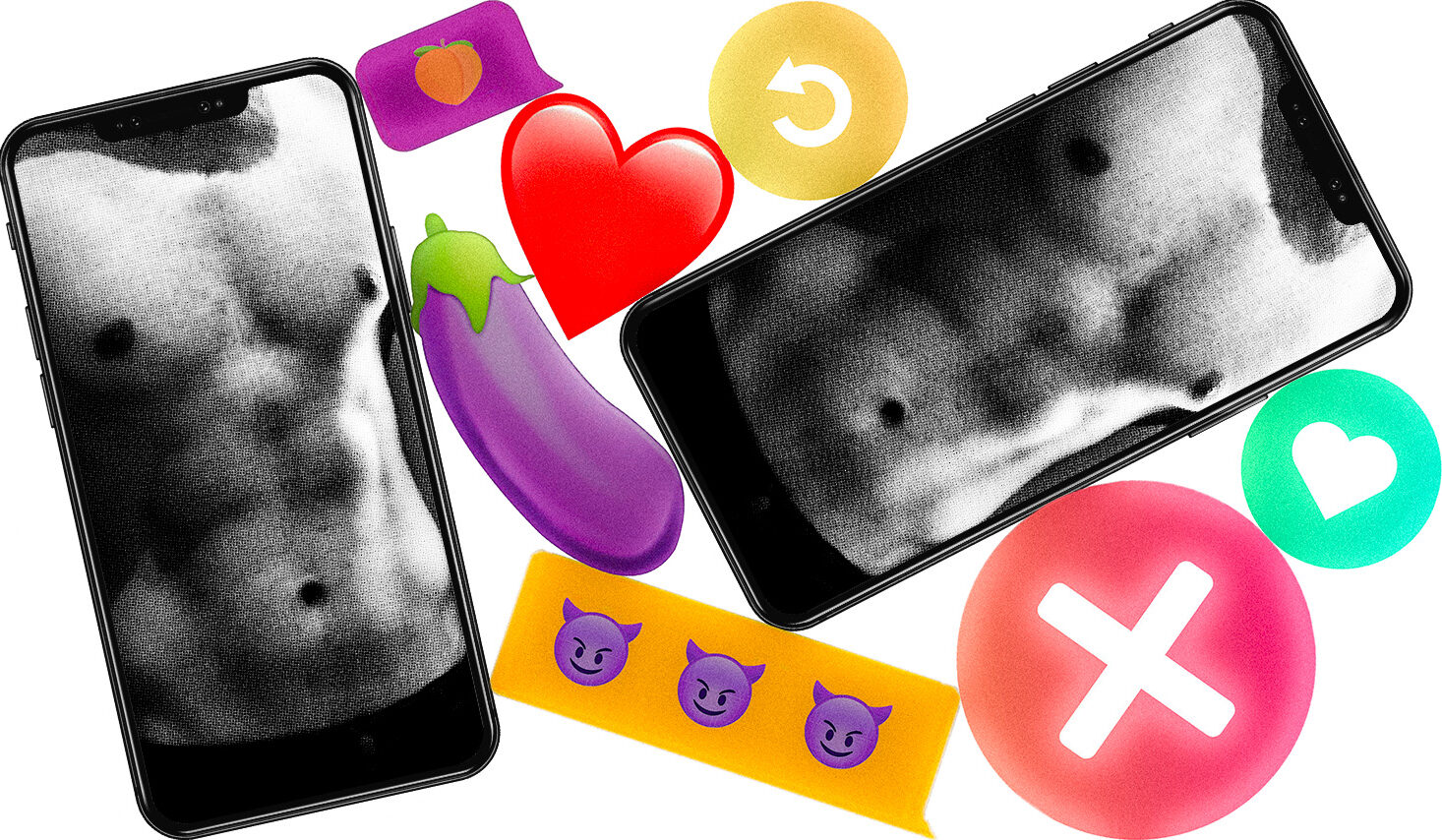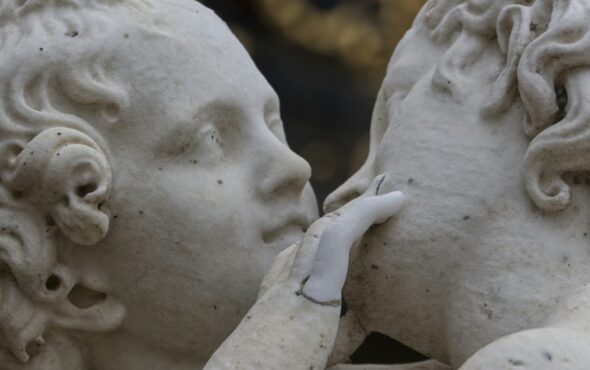
Dating apps like Grindr, HER, Scruff, Hinge – the list goes on – have all helped to revolutionise queer dating. In a world where gay men once had to use colour-coded handkerchiefs to highlight their sexual interests, the digital dating landscape has meant you can find a fuck, a fisting or a forever at the mere click of a button. Despite their prolonged success, relentless swiping and dead-end conversations have started to wear thin, and there’s a distinct rise in dating app fatigue.
30-year-old Chris Henderson from Mytholmroyd in West Yorkshire can attest to this, saying that the same mundane conversations have left him feeling like it’s Groundhog Day. He accepts that apps like Grindr and Tinder have their benefits, offering “instant validation that feels like a dopamine hit”, but feels unsure where to look when it comes to finding genuine romantic connections offline. “I’ve grown up in a small town where there are not a lot of people for me to naturally bump into or to create an authentic connection with. It regularly comes from online, which is always frustrating,” he tells GAY TIMES.
Admittedly the apps have become somewhat of a comfort blanket for him. Time-wise, they’re manageable and fit around his schedule. They can be utilised when he’s feeling his best and shunned when he’s feeling less confident. Henderson does, however, believe that his app use has come with some negative consequences. “I’m aware that from using hook-up apps, I’d be more comfortable meeting up with someone for casual sex than I would be getting to know somebody. It’s great that I feel so sexually confident but I think it’s telling that I would feel more at ease with just taking my clothes off than having a conversation,” he says.
“It all comes back to rejection. I feel I could handle being rejected in a sexual environment because they don’t know me as a person and they’re not rejecting me for who I am. Whereas if I was rejected after spending hours of getting to know someone, that would cut deeper because you’re being rejected as a person.”
Rejection is just one of a plethora of fears that come with moving your dating life away from the apps and into the real world. It can be daunting to even consider deleting the apps and putting yourself out there – many don’t know where to start. Thankfully, queer-identifying and queer-affirming therapist, Ryan Campinho Valadas, is on hand to offer some advice on how to find other queer people who are interested in dating.
I want to date, but I don’t want to rely on dating apps or nights out at bars and clubs. What should I do?
Dating has changed a lot in the past few years, especially with the rise of the apps. I think apps sometimes contribute to people being less able to communicate how they really feel and being less authentic because it is easier to put on a performance when you’re dating digitally. I feel that people are increasingly tired of them.
There’s a real fatigue around dating apps that I see constantly in my therapy space. But I think there are definitely alternatives to apps and to nightclubs. I like to explore with my clients about what they might be interested in. Ultimately, before apps came along, this is how we sometimes met people; through similar interests, or through mutual friends, and so there was a commonality there that we have perhaps lost because of the apps and the digital world.
It’s really about checking in with yourself, and asking ‘What are some of the things that I enjoy doing? Are there any groups in my local area that I could join?
It’s really about checking in with yourself, and asking ‘What are some of the things that I enjoy doing? Are there any groups in my local area that I could join? This is also not necessarily from a place of ‘I need to find a partner in this group’, but an opportunity to meet new people and giving yourself the permission to be yourself. I think that is much easier to do when you’re doing something you enjoy, and so by being in a group with people who like the same things, you would actually be able to be more authentic.
I want something serious but I’m finding the people I speak to are only looking for hookups.
Dating apps can make people feel like commodities. It’s so easy to swipe either way and you don’t think too much about people in those scenarios, which reinforces a sense of disposability. There’s this ideology that there’s always someone better out there, just around the corner. I think this idea creates a restlessness and because people are generally quite busy and there’s lots going on in the world, this can make it hard for people to connect to their intentions and what they’re really looking for.
Everything is moving at such a fast pace. It’s really hard to slow down and take time to analyse yourself, reflect and ask ‘What are my intentions? What am I really saying to people when I’m meeting them?’ I think this makes hooking up easier for people. They don’t want to think too hard about meeting people, they want something simple and quick without too much drama. Serious and committed dating takes time. It’s a lot slower. This does make it harder to find but it’s not impossible.
Serious and committed dating takes time. It’s a lot slower. This does make it harder to find but it’s not impossible.
It’s really hard to go against what is culturally dominant and right now is fast and easy, which feeds into hookup culture. I think it’s become really normalised to talk about sex very quickly and if that is all the conversations you’re having, it becomes really hard to put up your boundaries and say ‘No. I don’t want to do that. I don’t like to do that. I want to do something else with this conversation’, but it’s important to set those boundaries from the outset and make your intentions clear.
How do I set boundaries to ensure that the people I speak to know that I’m interested in dating rather than hooking up?
I think the main thing I always like to say about boundaries is that they are guides for yourself. Boundaries are not things that we put up in order to tell people what to do with their lives. They are there for us to know what we’re doing with our lives, and for people to know what we are doing with our lives. If they want to change according to that, they can, but if they don’t, they don’t. Ultimately we can’t control that. We can only control ourselves.
It’s important to establish intentions: What is it that you want? What is it that you’re looking for? One thing that people often miss about boundaries is that it’s important to match what you’re saying with what you’re doing, because where our boundaries falter quite often is in the doing. We may be very clear with what we say and how we communicate our boundaries, but if our behaviour doesn’t match the boundary, ultimately we’re giving other people mixed messages and we’re also giving ourselves mixed messages which is ultimately you telling yourself ‘What I need and want is not important because I’m faltering on my own commitment to myself and I’m not valuing my own commitment and own intention’.
It’s important to establish intentions. One thing that people often miss about boundaries is that it’s important to match what you’re saying with what you’re doing,
Every time we fail to maintain a boundary, psychologically we’re telling ourselves that we’re not important enough and we therefore take away a piece of our self-esteem and confidence. Yet, every time we exercise our boundaries effectively, we get a boost of confidence, self-esteem and self-worth.
How do I find people to date when my friends are predominantly straight?
This is potentially either simple or complex, depending on the situation. Yes, a queer person might not meet queer people if they’re only in straight spaces or only around straight friends, so at some point, there has to be a move away from those spaces and those people in order to meet more gay or queer people. That can be a case of joining special interest groups, hobbies, or clubs. There has to be a move towards more queer spaces in order to meet more queer people.
However, there may be psychological aspects that make that difficult. For instance, examining what feels comforting about your friends and the spaces that you’re in and what feels scary about moving into those queer spaces? Can the person work on those things? Can they ask for their friend’s support? Can they maybe even seek a professional for just a few sessions?
It’s not something that is a crisis but sometimes short-term therapy with a queer therapist could be really helpful to get a bit of confidence to be able to join new spaces. There’s some doing there about trying new spaces, but then there’s also some emotional work to do about uncovering why that might be difficult.
I really want to date more but I’m worried about rejection.
I often talk to my clients about the randomness or mystery around meeting people and finding a connection. For example, we might meet someone and get on straight away, and we can also meet someone and completely dislike them straight away. We are the same person in each scenario and yet, the combination of who we are and who they are, sometimes just doesn’t work. The “why” of rejection, or lack of connection, isn’t always clear.
Ultimately, we can only control ourselves and so the autonomy to make any changes in life relies on our capacity to self-reflect
We don’t really know what’s going on in people’s lives, and they don’t know what’s happening in ours. I find that people often assume a lot about what happened in a situation or interaction – the typical never-ending analysis of text messages. But ultimately, we can only control ourselves and so the autonomy to make any changes in life relies on our capacity to self-reflect and act based on what we feel is important.
